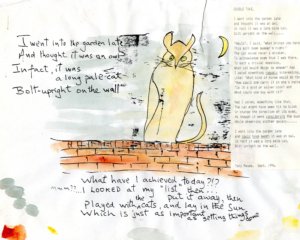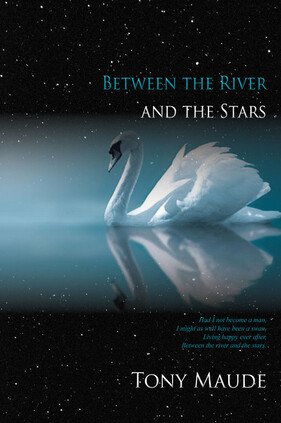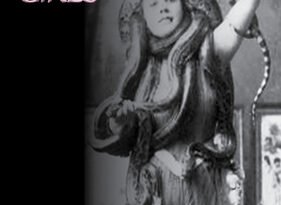Between the River and the Star
by Tony Maude
($19.95, (7″ x 10″) paperback, 168 pages with 23 photographs and color illustrations by the author)
INTRODUCTION
“Man is least himself when he talks in his own person. Give him a mask, and he
will tell you the truth.”
Oscar Wilde
Having said that, here are a few facts, a bit of background, a word or two in my “…
own person,” to introduce this book. I owe that to Little Red Tree Publishing for
kindly persuading me, after many years of pencil-sharpening and chewing, to finally
put these poems on a page. Such a poem is only “half a poem” according to Dylan
Thomas and, in tune with this notion, I have spent the aforesaid many years,
learning by heart and performing those ones that it seemed would feel at home in
“A Show.”
I was born in India, a hill station seven thousand feet above the sea and beside a
boat-skimmed lake with, in the background, blue and strange-shaped mountains.
Not a bad place to greet the World. My Dad was an Army-Man, and the nomadic
life we led put me ashore at boarding schools in green and pleasant parts of
England… and, at the first of these, when I was eleven, my career as a storyteller
and poet began.
After “Lights Out” in a dormitory of ten or so beds, with a very fine view over
Surrey and Sussex to the South Downs and their promise of the coast beyond, I
would tell stories to my fellows. A serial that went on night after night―I can’t
imagine how I managed thus to spin it out! “My Life in India” was the title, and
seeing that the family had left for England shortly before I was two, my
memories must have been scanty, if indeed I had any. The truth is that these
stories were all based on those my grandmother told me: picking fruit before
breakfast and coming face to face in the mango tree with an awakening and
uncoiling cobra… or… the time when a circling eagle crashed down and went off
with one of the kittens. All this was just before I came across Shakespeare, on an
outing from the same school: Julius Caesar at Guildford Theatre. The play held
my interest well until, towards the end, Mark Antony tells us: “This was the
noblest Roman of them all…” a speech which ends with “…that nature might
stand up and say to all the world, this was a man!” These words acted as
introduction, became companions, said “Come along,” thus handing me a key to
the secret garden.
Just before I went to university, I found myself in Paris on the way back from
hitching down to Spain. A concert at Olympia―the great theatre of “La Chanson
Poétique,” whose songs I loved then and still do: Georges Brassens, Jacques Brel,
Anne Sylvestre… Barbara. That night, however, they had guests from abroad:
The Everly Brothers, supported by Peter, Paul and Mary. I’d heard the latter’s
sweet and harmonious versions of folk songs but that night they introduced a
song by a “new, young songwriter from the USA”—during which, came the
words: “ain’t no use in turnin’ on your light Babe, the light I never knowed… ain’t
no use in… I’m on the dark side of the road…”—this was another “noblest
Roman” moment. That “…dark side of the road” was to me, a revelation. In this
way, Paris (France!) ’63, I was introduced to Bob Dylan.
Dylan Thomas, I already knew: “A Child’s Christmas in Wales” for one thing,
which my Mum and I watched on TV and were taken utterly in thrall. These
landmark experiences kept coming and must have made me decide: “I’d better
start writing things down myself.” It all began for Thomas, he said, with Nursery
Rhymes—how, before he understood their meaning, the very sounds of the
words captivated him. I’d agree, but after sounds came Stories and with them an
an added sense of Poetry:
My old Auntie Stella,
May God and all the Angels bless her,
Was the first person to say to me
The word, what she called “Poi-etry:”
“The Knights of the Four Winds,”
Gonsalves was the man:
Serpents, Damsels, Oceans, Snows…
And then she went on to read me:
“Wild Animals I Have Known” and
“The Trail of The Sandhill Stag*,” that’s
Poetry! Handfuls of words like-dice-thrown,
That look you in the eye and say “Listen… listen!”
*by Ernest Seton-Thompson, American conservationist.
I went to Oxford University in ’63 to pursue my love of language and literature
“officially.” It was also then that I began writing songs for Cabaret Shows, with
many a later-to-become-famous artiste, including some of the Monty Python
team. Every time I go back, I’m amazed by the beauty of the place, and equally
troubled by the feeling: what a shame I couldn’t appreciate it while I was there.
Just the other day, looking up at my “rooms” at New College (Kris Kristofferson
also went there), I noticed a small and exquisite stone carving beneath the
Gothic arch of my window: a medieval piper, with cloak and hood who must have
always been there. I couldn’t believe that I’d missed him during all those years!
Although I suppose,
In the rough and tumble of those days,
I may well not have seen him but
On some Summer’s or Winter’s night,
How can I not have heard him play?
Once released from the academic life, I moved to London and began playing,
singing and writing songs. I was involved with running a show from 1968 to
1976, at the world-famous Troubadour Club, Earl’s Court, with Nigel Barker, poet
and songwriter. “Everyone” has played there: Bob Dylan, Paul Simon… you name!
Tom Paxton came down one night and regaled us. It was there I met and
became friends with many of the musicians with whom I was to work and record
thereafter: Paul Millns, who produced my first two albums and plays inspired
keyboards on all three for “Autogram,” Germany. Shusha, who recorded my
settings of Elizabethan poets on various successful records, Tony Bird who
amazed us all: his guitar style, his voice and songs overflowing with the beauty,
the sadness, the sounds and the colours of Africa, and not least, the publisher of
this book, who was then part of the brilliant guitar duo “Linnard and Hughes.”
During this time, I wrote the occasional poem—have a look at “Christmas Cheer
in Dryburgh Road, Putney.” (page 70) This follows a strict rhyme scheme
(unusual for me!) and is dedicated to John Betjeman. My poems were then few
and far between, being too busy as a singer-songwriter. Year after year, I toured
on the continent—Germany and Holland at first and later in Italy—always at the
wheel of an old Ford van: “You mean you drove this here, all the way from
London?!” “I did… and I’ll be driving it back there again!!”
I’m no good at dates but I know this one, it was in 1988 that I “seriously” began
writing and performing poems. The poem that started this new lease begins:
“Written for Ben on his Birthday.” With this poem “Without Surprise” (page 28)
and one or two others, I tried my luck in the London Poetry Clubs and was
amazed that I was offered a booking in the first one I went to. Subsequently, I
performed throughout London and beyond as the “main guest” and for this, I was
occasionally paid!
It’s actually no surprise that the breakthrough poem (above) is steadfastly based
in the Natural World, as are many others in this collection—it was Auntie Stella,
again, who taught me:
In the voices of the forest
Firmly to believe
And that “Poi-etry” is to be enjoyed!
There was a school anthology we used called “Poems for Pleasure.” I’m sorry but
“What else would they be for?” As Feste, the clown sings in Twelfth Night: “We’ll
strive to please you every day…” And this has been a trusty guide in my attitude
to “The Business of Poetry.” In this sense, a poem is like a joke—you can’t enjoy
it if you don’t get it.
Some enlightened person had left money to pay a different writer every year to
come to my second boarding school and read us their work. One of these was
John Betjeman and his evening far outstripped the others. It was a Performance,
a Tour-de-Force which began with a magnificent “ice-breaker”—for the whole
story, I’m afraid you’ll have to wait for Volume 2, as the poem thereon is still in
the making. That evening was another landmark, another “I see!” Another “So,
That’s the way!!”
I often think of poems in terms of what I call “Village Hall.” I imagine—I or we—
have been booked to entertain all and sundry this very evening. The place will be
packed‚—people from all walks and of all ages. The show will go fine if we speak
from the heart, with music and drama, some tears/some humour, take them on a
journey, make it clear, push the boundaries so they go home happy and come
back next week/month/year… for more.
~~~~~
A wonderful poem by George Herbert begins
“When God at first made man,
Having a glass of blessings standing by…”
I once won a “recite by heart” competition with this as set text. I can still
remember most of it, especially the phrase “glass of blessings” i.e. man’s
qualities crammed into a glass, ready for God to bestow as he wished. This made
me think of the “Glass of The Arts” and Poetry’s position in it. Recently, I heard a
radio programme on Dance and the spokeswoman described her calling as the
“Cinderella” of the Arts—in terms of funding, interest, and support. In a way, she
may be right, when you think of the cash poured into opera, classical music and
theatre, not to mention “The World of Fine Art Painting!” However, if Dance is the
Cinderella, what’s Poetry then? The Ugly Sister? The mouse in the corner…?? Try
to imagine the Sydney Opera House changed to Sydney Poetry House! However, I
suggest that there are many more people with a small part of their souls
reserved for perhaps just one poem, or maybe just a line… than are those
familiar with even the most famous Puccini aria… Here is an example.
“At the going down of the sun and in the morning,
We shall remember them.”
Taken from “For the Fallen” by Robert Laurence Binyon
This line was suggested by an elderly member of a Poetry/Music workshop in
Ireland acted as a key for other members of the group to “remember” lines and poems.
Here I should add, with some respect towards those who run the show, that I
have found poetry to be largely the domain…
Of Old People and Children,
For instance, the poem “NO WEBS” (page 27)
Was first published in the garden.
I wrote the so-called Proclamation on
A sawn-off piece of skirting-board and
Hung it on the apple tree. Many “Humans”
Passed that way, all well-established adults—
The poem was neither read nor noticed by a soul,
Till: enter, wide-eyed, Freddie from Cornwall.
He was ten or eleven and the first to mention it,
That goes for the spiders an’ all, for whom
It was written, not one of them
Paid a blind bit of notice! With this piece
Of evidence I… rest my case.
As regards the title of this book, “…The Stars” speak for themselves but from an
early age I have been vociferously speaking for and about “The River…” When I
was seven, a refined and kindly old gentleman—Major Stanley-Clark, used to take
me for walks along the River Wey: summer evenings, setting sun, herons, swans,
bits of fishing-line or “is it a spider’s web?” that must have been when it all
began. Here are a few highlighted references to rivers from the poems in this
book:
“the black-ink glinting water” (the Rhine in Winter, page 84)
“wandering weeds and bubbling beads philosophy… polish your stones and
whistle your tunes… and take it easy.” (the river Wey in all seasons, page 54)
Some years ago, I visited Stratford—the home of William Shakespeare—paddling
downstream from Warwick along the river Avon. One night I went to the famous
theatre by canoe, from the camping site, half a mile upstream. The play I saw
was a walkabout through the town and surrounding fields, in which the audience
was encouraged to buy huge “medieval” tar torches to help light the procession’s
way. At the end, people discarded them in a scattered, giant-matchstick bonfire. I
took one, still burning, tied it to a cross-member in the canoe and paddled
“home” along the Avon.
Sending shadows and shards of gold
Skimming over the dark water,
Into the overhanging foliage
And up to the summer’s night stars
And finally:
A fine river runs across County Clare—the Fergus—it winds its way through many
a lake and out to the Atlantic at Clarecastle. I was once swimming alone by an
old stone bridge and was spied by a swan, which had cruised up through one of
the arches. With seven cygnets downstream, he or she was furious to see this
intruder and came towards me, wings beating and spitting fire.
Having just emerged from the water, dripping and naked, I stood my ground and
said: “Ok, Ok, I understand, but these waters are to share, this is also my river.”
Had I not become a man,
I might as well have been a swan,
Living happy ever after.
Between the River and the Stars.
You will no doubt notice that I have used a good number of quotes from others
in this introduction. This I consider to be essential to show what inspired, what
pushed the boat out and trumpeted the sense of “not alone.”
Here, to finish is a quick true story, which in part sums up my “life as a poet.”
Forgive me, but to fully understand this you’ll have to refer to the last poem in
the book ahead: “Answering Dad Back” (Page 126)
At one of my shows in a Belfast Psychiatric Hospital, which included this poem, a
young man approached me at the end of the gig. He had a faraway expression,
which, before he spoke, came suddenly into focus. He looked me in the eye and
with somewhere between a smile and a frown, said simply: “…and managed to
write it down.”
“So what have I achieved?
No feat of great renown but
I’ve seen the visible world
on a winter’s dawn
And managed…
to write it down.”
Tony Maude
London, England 2013



REVIEWS
“He uses poetry as a dowsing rod in his, it must be said, ‘cheerful’ search for the
sense of things.”
—Franziska von Busse ― review in Westdeutsche Zeitung.
“Poetry plays a large part in the proceedings, but at the core is his uncanny
ability to see inside a mood and act accordingly”
—Time Out, London.
“A lovely poem…has left us all breathless.”
—Belfast Community Radio.
“The work of a poet who can write a good song.”
—Daily Telegraph.




